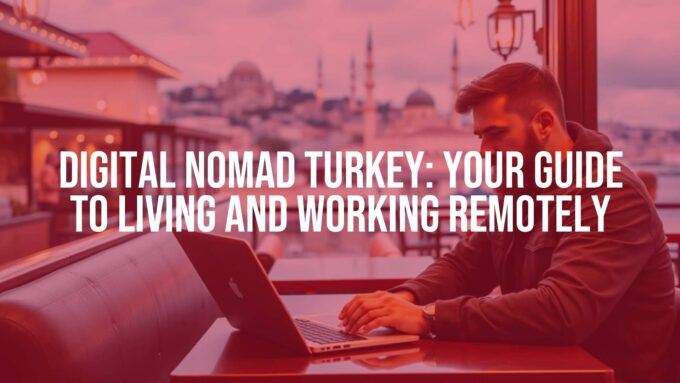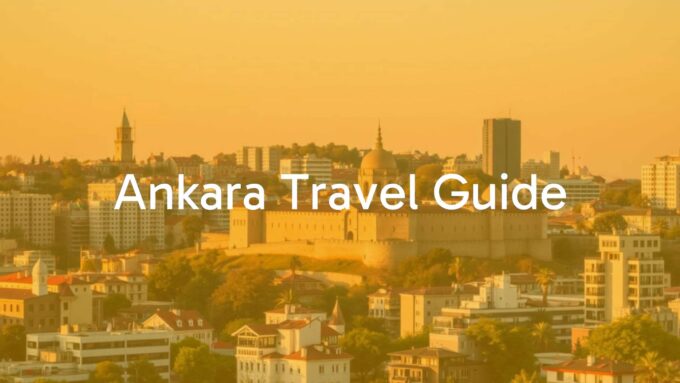Living in Turkey as an expat gives you a mix of deep history, colorful culture, and a much cheaper way of life than many Western places. Turkey stretches across both Europe and Asia, offering a special blend of Eastern and Western influences. For many people looking for new experiences, Turkey becomes an exciting place to try life in a different country. While moving to Turkey can involve several things to think about, most expats agree that the country offers a satisfying and interesting way of life.
Whether you prefer a busy city or a peaceful seaside town, Turkey has many different settings to choose from, each with its own special qualities. This article explains what expat life in Turkey is like, giving practical advice for anyone thinking about moving here.

Basic Information: Life in Turkey for Expats
Turkey’s location at the crossing point of Europe, Asia, and the Middle East makes it a popular choice among foreigners. Its long history of trade and diplomacy has helped Turkey become welcoming to people from other countries.
People new to Turkey often first notice its beautiful Mediterranean and Aegean coasts, along with the ancient feel of its cities. Many expats say Turkish people are very warm and friendly, which helps newcomers find a sense of community more quickly than in some other countries.
Why do expats choose Turkey?
Many foreigners pick Turkey because living here is a lot less expensive than in Western Europe, North America, Australia, and many Asian cities. Rent, food, utilities, and entertainment all cost much less, so expats can enjoy a better lifestyle for their money.
Besides the low cost, the Mediterranean way of living is very appealing-great beaches, fresh food, relaxed days, and plenty of history and culture to explore. Turkey’s growing economy, which ranked 18th in the world in GDP in 2024, also brings good options for investment, especially in real estate. Some people are also drawn by the chance to get Turkish citizenship by investment, often as a way to have a second home or vacation spot.
Who moves to Turkey?
Turkey’s expat population is very mixed. Some come for work, often in sectors like IT or tourism, where skills are needed. Digital nomads find solid internet and shared workspaces in large cities. Retirees are attracted by low living costs and a warm climate, which makes their pensions stretch further.
Schools teaching in English (and other languages) are available for families, and many people move to Turkey through its citizenship programs, which require buying property or investing in the country.
Pros and Cons of Living in Turkey
Moving to Turkey, like any move to a foreign country, means there will be some things you enjoy and others you find hard. Knowing about both can help you prepare for a smoother move.
Main benefits for foreigners in Turkey
- Low cost of living: Money from abroad often goes further. This means better housing, healthcare, and private schools are within reach.
- Warm weather: Especially near the Mediterranean and Aegean, nice temperatures year-round make outdoor life enjoyable.
- Welcoming culture: The people are friendly and helpful to newcomers, making it easier to settle in.
- Great location: Close to Europe, the Middle East, and Asia for travel or business.
- Easy residency through property ownership: Buying a home in Turkey can also help you get residency quickly.
- Banking and privacy: Turkey’s banks offer a safe place to keep your money and manage financial matters.

Main difficulties for expats
- Language barrier: Turkish is essential for everyday life and handling official matters, especially outside tourist areas.
- Slow official processes: Paperwork for permits and permissions can move slowly. Local help or lawyers are often needed.
- Fluctuating currency and inflation: The value of the Turkish Lira changes a lot, so it’s good to keep most money in stronger currencies if possible.
- Challenging job market: Foreigners may find it hard to get jobs, as some companies must prove they can’t fill roles locally first.
- Adjusting to cultural differences: Outside big cities, life can be more traditional, with different social habits and dress codes.
- Political and economic changes: Turkey can see changes in rules or public mood with little warning, so it’s best to keep informed.
Cost of Living in Turkey
Comparison with the US and Europe
Life is much cheaper in Turkey. Compared to the USA, costs (excluding rent) can be about 85% lower, and with rent included, about 117% lower. Compared to the UK, living expenses are about 43% lower without rent and 47% lower with rent. Below is a table showing typical monthly costs:
| Expense | Turkey (USD) | USA (USD) |
|---|---|---|
| 1-bedroom city center rent | 576 | 1,757 |
| 3-bedroom city center rent | 970 | 2,932 |
| Utilities (85m2) | 59 | 207 |
| Meal at low-cost restaurant | 8.76 | 20 |
Cheapest Turkish cities for expats
- Istanbul: Highest rents, especially downtown ($1,000+ for one bedroom), but still cheaper than similar global cities.
- Kadıköy (Istanbul Asian Side): Slightly lower rent than in city center, good community feel.
- Antalya & Izmir: Lower costs and still excellent living standards in many areas. Best for those wanting a relaxed pace.
- Small towns: Even cheaper but with fewer international services.
Planning your monthly budget
With the Lira’s ups and downs, it’s smarter to keep most savings in stable currencies and only exchange as you need. Living in Istanbul, a single person might live comfortably on $1,500-$2,000 a month, while a family of four might need around $2,800-$4,000, depending on housing and schooling.
Average monthly expenses:
- Utilities: $60-$100
- Groceries: $300-$400 (for two, mostly fresh food)
- Public Transport: $40/month for an Istanbulkart
Eating at local restaurants and shopping at street markets can stretch your budget further. Watch exchange rates-they can have a big effect if you’re paid in foreign currency.
Best Cities to Live in Turkey for Expats
Istanbul: Modern city life
Istanbul, with over 15 million people, is top choice for many expats who want a busy city with lots to do. It is a city that sits in both Europe and Asia and has famous landmarks, great food, busy nightlife, and a young, active crowd. It offers more job options-especially in IT or hospitality-plus international schools for families. Rents are higher, but still more affordable than in most major Western cities, and the public transport system helps people move around the large city easily.
Antalya: Seaside comfort
Located on the southern coast, Antalya is best for anyone wanting a slower pace and a warm, beachside life. Its old town areas and modern services make it attractive for retirees and those who want to relax but still have good shopping, healthcare, and entertainment. Other local towns like Kas, Side, and Alanya are also popular for peaceful living.

Izmir & Other Good Options
- Izmir: Family-friendly, many safe beaches (over 60 Blue Flag beaches), mild climate, and close to historical attractions. Its Western feel helps new expats adjust easily.
- Bodrum: Known for a lively lifestyle, draws digital nomads and expat investors.
- Bursa: Rich in history and culture, often more affordable and quieter than Istanbul.
- Alanya and Marmaris: Favored by sea lovers and those seeking growing communities.
- Ankara: The country’s capital has a strong economy, lower rents, and a quieter feel.
Visa and Residency Rules
Types of Residence Permits
For stays longer than three months, foreigners must get a residence permit (ikamet). Applications are made within 100 days of arrival-ideally after spending a month in Turkey. Most people start with a short-term permit (good for up to 2 years), which requires proof of address, health insurance, and enough savings to cover your stay.
After eight years on a temporary permit, you can apply for a long-term one, which can also let your spouse and children stay with you. Retirees can often renew two-year permits easily, making it straightforward to stay longer if desired.
Getting Turkish Citizenship
Foreigners can become citizens either by living in Turkey for at least five continuous years (and meeting certain requirements), or much faster by investing in the country. See common entry options below:
| Option | Minimum Investment |
|---|---|
| Buy Property | $400,000 |
| Bank Deposit | $500,000 |
| Government Bonds | $500,000 |
| Hire Employees | Employ 50 people |
Many choose to buy real estate for citizenship because it gives them a vacation home too.
Visa Needs by Nationality
- US, EU, UK, Canada, Australia: No visa needed for tourist stays up to 90 days in a 180-day period.
- Many nationalities can apply for an online e-visa or buy one at the airport for short visits.
- Longer stays or work/study need a “sticker visa” and then a residence permit.
- All applicants must show a rental contract or property deed, proof of health insurance, and bank statements. Since rules can change, local help is recommended for paperwork.
Accommodation and Real Estate
Buying Property
Foreigners are allowed to buy homes in Turkey (except in some restricted areas). Lots buy property as both a home and a way to invest, sometimes also aiming to get Turkish citizenship at the same time. Work with a trusted local agent and lawyer to avoid problems, as rules can be strict about location and paperwork. Prices are highest in Istanbul, the coast (Antalya, Bodrum), and new developments, but there’s something for every budget.
Renting Apartments
Renting requires a residency permit. Rents have gone up in recent years, especially in larger cities:
- One-bedroom city center (Istanbul): $700-$1,100/month
- Two-bedroom in popular expat areas: $1,200-$2,500/month
- Outside city center (Kadıköy, Asian Side): $1,200-$1,600/month for two bedrooms
Most rentals are unfurnished. Many landlords want several months’ rent upfront and may ask for payment in foreign currency. It’s helpful to use English-speaking websites like Sahibinden or agents. Understanding your rental agreement (who pays for repairs or utilities) is important-using a local agent helps a lot if you don’t speak Turkish.

Things to Watch Out For
- Check who pays utilities and that your rental is officially registered because it helps with residency applications.
- Short-term hotels or Airbnb can help you test out a neighborhood before signing a longer lease.
- It’s good to get local advice or use trusted expat referrals to avoid scams.
- Water, electricity, and gas are reliable in cities but ask about water supply in summer in some towns. Boil drinking water if you buy it from local vendors.
Working and Paying Taxes
Jobs and Work Permits
- Most jobs for foreigners are in IT, hospitality, or international companies. Many positions in healthcare, real estate, or government are for Turkish citizens only.
- To work legally, you need a work permit. The employer must show that no Turkish person is available for the job. Documents include your passport, degree certificate (translated), photo, any job history letters, and a signed contract. The process usually takes about a month.
- The work permit also works as a residence permit, but losing your job usually means your permit is canceled-so job security is important.
Starting Your Own Business
- Foreigners can start companies by following the same steps as locals.
- Turkey’s location and low overhead make it a good place for businesses, especially those dealing with import, export, or logistics.
- Some tax-free zones offer exemptions from tax and import duties to encourage trade.
Tax Rules
- You become a Turkish tax resident if you spend more than 183 days a year in Turkey.
- Taxes on local income use a sliding scale from 0-35% after allowable deductions.
- Income from outside Turkey may not be taxed, especially if you don’t live in Turkey full time.
- Retirees with foreign pensions pay only 15% tax if the money comes from outside Turkey.
- For complex cases, a local accountant or tax consultant can help set things up properly.
Healthcare and Health Insurance
Public vs. Private Health Care
- Public system (SGK) is available for residents and covers most needs, but wait times can be long and some staff may not speak English.
- Most expats prefer private hospitals or clinics, with modern facilities and staff who speak English. Prices are lower than in Western countries.
- Turkey is a growing destination for medical tourism. Many hospitals are internationally accredited.
How to Use Medical Services
- Medical insurance is required for all residency and work permits. You can buy private or public (SGK) insurance.
- Private clinics charge $30-$60 for a visit. Hospitals have many services, so always ask about costs before major treatments.
- Pharmacies, marked with a red “E”, are found everywhere and sell both prescription and common medicines at good prices.
- For emergencies, dial 112 for an ambulance.
International Health Insurance
Many expats prefer private or international health insurance, especially if they want coverage for emergency evacuation, dental care, or other extras. Some plans cover both in Turkey and outside, which is useful for travelers. It’s smart to check the policy details before buying, to make sure they meet what is needed for residency requirements and personal needs.
Schools and Education for Expat Families
International and Private Schools
- Most expat families use private or international schools, which teach in English (or another language) and usually follow UK, US, or international programs.
- School fees are lower than in most Western countries, but apply early as places are in high demand.
- Public schools teach in Turkish, which can be hard for newcomers, but some private schools teach Turkish as a second language to help children fit in.
Language and Getting Used to School
- Lack of Turkish can be tough for new students, especially in public schools. Learning basic Turkish-even if most classes are in English-helps children make friends.
- Kids may also need time to get used to local customs (like the busy pace in some cities or seeing stray animals), but many adjust quickly thanks to emphasis on family and community in Turkish culture.
Is Turkey Safe for Expats?
Personal Security and Crime
- Istanbul and other big cities require common caution (watch belongings, avoid risky areas at night). Most problems are minor crimes like pickpocketing rather than violence.
- Outside big urban centers, crime rates are lower, and people often look out for each other.
- In busy places, be extra careful about traffic and fast-moving scooters.
Political and Social Situation
- Turkey sometimes sees fast changes in its policies. Protests or sudden rule changes do happen, but these rarely affect everyday life for foreigners.
- The main worry for locals is often economic-prices can rise quickly due to inflation. Still, direct impact on expats (especially if paid in foreign currency) is limited.
- Support from expat groups and the overall welcoming attitude of Turkish people helps newcomers settle more easily even during uncertain times.
How to Adjust to Turkish Culture and Day-to-Day Life
Social Tips and Traditions
Turkish society values hospitality, family, and togetherness. Expect to be invited into people’s homes or to be given food. Saying “no” directly is sometimes considered rude-the phrase “we’ll see” can be used instead. Dress modestly when visiting religious sites, and remember that attitudes outside touristy or city areas are often more conservative. There’s a mix of religious and secular customs, so being respectful of both is wise.

Learning Turkish and Everyday Communication
Learning some Turkish, even just key phrases, helps a lot with settling in and making friends. Apps like Babbel or iTalki make practicing easier. Language barriers are bigger outside tourist areas, but people usually appreciate any effort to speak Turkish. Joining classes or practicing with locals often helps build connections and confidence.
Building Community and Making Friends
Turkey has many expat groups, especially in large cities and resort areas. Groups like InterNations are useful for meeting new people and finding advice. Making Turkish friends takes time but is helped by learning the language, showing interest in local culture, and living in the same neighborhood for a while.
Common Questions About Living in Turkey
What’s daily life like?
For both locals and expats, life in Turkey often means a close connection to family and neighbors, plenty of good food, and an active social scene. Eating out is normal and cheap, and most people enjoy spending time outside, especially in warmer months. City dwellers have to deal with traffic and crowded streets, while those on the coast enjoy quieter days. Making an effort to learn Turkish and try new things helps expats fit in more quickly.
Is Turkey good for retirees and families?
- Yes, especially for those who want a mild climate, low living costs, and affordable healthcare.
- Foreign pensions are taxed at 15% if paid from abroad, and money goes further than in most Western countries.
- Coastal cities and tourist towns tend to be easier for seniors and have large expat groups.
- Families benefit from many education choices and a society that values children.
How does Turkish bureaucracy affect expats?
- Official paperwork can be confusing and slow. Sometimes rules change without advance notice.
- Having advice from a local professional (such as a lawyer or relocation company) can save time and frustration.
- Don’t leave applications for residency, work, or visas until the last minute-delays are common.
What are the main difficulties for newcomers?
- Learning the language is hard but important for making friends and handling daily life.
- Cultural differences-like how people communicate, dress, or spend free time-may take getting used to.
- Busy city life and traffic in places like Istanbul can be stressful. Adjust personal safety routines, especially in crowded areas.
- Currency changes and the cost of some imported goods mean budgeting is important.
- With time, an open attitude and the support of expat and local communities help most people adapt and enjoy their life in Turkey.















Leave a comment